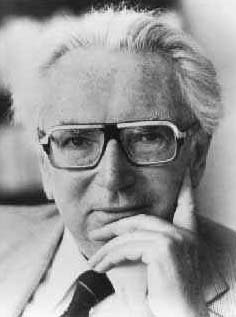 Frankl was the founder of logotherapy and Existential Analysis, the “Third Viennese School” of psychotherapy. His book Man’s Search for Meaning chronicles his experiences as a concentration camp inmate and describes his psychotherapeutic method of finding a reason to live.
Frankl was the founder of logotherapy and Existential Analysis, the “Third Viennese School” of psychotherapy. His book Man’s Search for Meaning chronicles his experiences as a concentration camp inmate and describes his psychotherapeutic method of finding a reason to live.
Links
- Viktor Frankl Institute, Vienna
- Viktor E. Frankl Biography
- Obituary By ROLAND PRINZ The Associated Press
Books
- Man’s Search For Meaning
by Viktor E. Frankl
Paperback: 224 pages
Publisher: Pocket (December 1, 1997)
ISBN: 0671023373 - Man’s Search for Ultimate Meaning
by Viktor E. Frankl
Paperback: 208 pages
Publisher: Perseus Publishing (July, 2000)
ISBN: 0738203548 - Viktor Frankl Recollections: An Autobiography
by Viktor E. Frankl, et al
Hardcover: 143 pages
Publisher: Plenum Pr (May 1, 1997)
ISBN: 0306454106 - The Doctor and the Soul : From Psychotherapy to Logotherapy
by Viktor E. Frankl
Paperback: 352 pages
Publisher: Vintage (October 12, 1986)
ISBN: 0394743172 - The Will to Meaning: Foundations and Applications of Logotherapy
by Victor E. Frankl
Paperback: 208 pages
Publisher: Plume (September 1, 1988)
ISBN: 0452010349
Quotes
The one thing you can’t take away from me is the way I choose to respond to what you do to me. The last of one’s freedoms is to choose ones attitude in any given circumstance.
When we are no longer able to change a situation – we are challenged to change ourselves.
Love is the only way to grasp another human being in the innermost core of his personality.
The last of human freedoms – the ability to chose one’s attitude in a given set of circumstances.
Those who have a ‘why’ to live, can bear with almost any ‘how.’
Ever more people today have the means to live, but no meaning to live for.
What is to give light must endure burning.
Everyone has his own specific vocation or mission in life; everyone must carry out a concrete assignment that demands fulfillment. Therein he cannot be replaced, nor can his life be repeated, thus, everyone’s task is unique as his specific opportunity.
Since Auschwitz we know what man is capable of. And since Hiroshima we know what is at stake.
Everything can be taken from a man but one thing; the last of the human freedoms – to choose one’s attitude in any given set of circumstances, to choose one’s own way.
Life can be pulled by goals just as surely as it can be pushed by drives.
Only to the extent that someone is living out this self transcendence of human existence, is he truly human or does he become his true self. He becomes so, not by concerning himself with his self’s actualization, but by forgetting himself and giving himself, overlooking himself and focusing outward.
Ultimately, man should not ask what the meaning of his life is, but rather he must recognize that it [is] he who is asked.
For the meaning of life differs from man to man, from day to day and from hour to hour. What matters, therefore, is not the meaning of life in general but rather the specific meaning of a person’s life at a given moment.
We who lived in concentration camps can remember the men who walked through the huts comforting others, giving away their last piece of bread. They may have been few in number, but they offer sufficient proof that everything can be taken from a man but one thing: the last of the human freedoms — to choose one’s attitude in any given set of circumstances, to choose one’s own way.
A human being is a deciding being.
Each man is questioned by life; and he can only answer to life by answering for his own life; to life he can only respond by being responsible.

 Meaning Conference 2025 will be the INPM’s first in-person conference with a virtual option after the pandemic.
Meaning Conference 2025 will be the INPM’s first in-person conference with a virtual option after the pandemic.